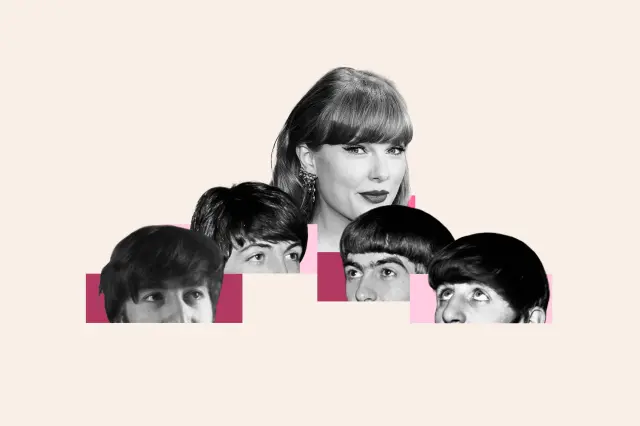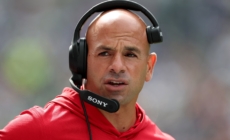-
Trump Is the Ultimate Davos Man - 21 mins ago
-
Trump Threatens 200% Tariffs on Wine if France Declines to Join Gaza Board of Peace - about 1 hour ago
-
Judge Allows Policy Restricting Lawmakers’ Access to ICE Facilities - 2 hours ago
-
Jimmy Fallon Teases Trump Over Secondhand Prize - 3 hours ago
-
After Four Shark Attacks in 48 Hours, Australia Shuts Dozens of Beaches - 3 hours ago
-
U.S. Tells Judge It Will Appeal ICE Restrictions in Minneapolis - 4 hours ago
-
The Chinese Island Where Dreams of Real Estate Glory Never Die - 5 hours ago
-
Titans Reportedly Hiring Robert Saleh as Head Coach - 5 hours ago
-
Trump Issues M.L.K. Day Proclamation After Criticism - 5 hours ago
-
Clashes Erupt Around Syrian Prisons Holding Islamic State Fighters - 6 hours ago
Is Taylor Swift bigger than The Beatles? Experts weigh in
The question of whether Taylor Swift has achieved greater success than The Beatles has risen to prominence after Swift broke a decades-old chart record previously held by the legendary group. With the evolution of music consumption—from physical sales in the 1960s to the dominance of streaming today—industry experts and fans are reconsidering what “bigger” means in terms of chart records, touring and cultural influence. The debate not only reflects differences across eras but also the rise of fan-driven conversations that shape contemporary music history.
The Beatles—consisting of late founder, singer and rhythm guitarist John Lennon, Paul McCartney, late lead guitarist George Harrison and drummer Ringo Starr—rose to fame in the United Kingdom in 1963 before exploding in popularity in 1964 on The Ed Sullivan Show in the United States. Despite being at the height of fame more than 60 years ago, their hit songs like “She Loves You,” “I Want to Hold Your Hand,” “Hey Jude” and many more are still widely recognized and enjoyed today.
Newsweek reached out to Swift, McCartney and Starr’s representatives via email for comment on Thursday.
Taylor Swift Beats The Beatles’ Record
Swift recently made music history, surpassing a long-standing Beatles record by scoring seven songs simultaneously in the United World Top 10—a feat announced by the World Music Awards and reported by Parade on October 13. The Beatles held the previous record with six songs in the Top 10 in 1964. Swift’s dominance is further highlighted by the success of her single “The Fate of Ophelia,” which debuted at No. 1 with nearly 700,000 points—mostly from streams—but also bolstered by sales and airplay.
On the touring front, Swift’s record-breaking “Eras Tour”—which ran for 21 months and concluded in December—exceeded $2 billion in revenue, twice the gross ticket sales of any other concert tour in history, The New York Times reported. This far outpaces The Beatles’ records from the 1960s, even when adjusted for inflation. Additionally, Swift’s live performances have had measurable cultural impacts, with seismic readings from her concerts cited as a unique testament to her popularity.
In fact, music mogul Irving Azoff even went as far to say Swift is “our Beatles” during an appearance on Bloomberg Screentime earlier this month.
Despite these achievements, The Beatles’ statistics remain formidable. The group issued 64 Billboard Hot 100 chart hits, 20 of which reached No. 1—a record still unmatched, per Billboard. Their estimated album sales, including compilations and live records, exceed a billion units worldwide, according to record label EMI, The Week stated. The changing architecture of the music industry—shifting from single and album sales to streams, downloads and multi-track charts—complicates direct comparisons.
Is It Fair to Compare Taylor Swift and The Beatles?
Music scholars and industry experts offer nuanced perspectives on the comparison between Swift and The Beatles.
Dr. Richard Mills—associate professor of English Literature and Popular Culture at St Mary’s University, London, and author of The Beatles and Fandom: Sex, Death and Progressive Nostalgia—told Newsweek: “History has to be the judge. We haven’t had enough time to look back at Taylor Swift’s total career including cultural impact, sales and streams.”
“The Beatles are culturally and commercially the biggest selling artist of all time,” he continued. “I also think that the diversity of their music is much greater than Taylor Swift who was a country singer that transitioned to a pop star. The Beatles’ music is much more diverse: Rock ‘n’ Roll, Pop, Soul, Blues, Ballads, Ska Pastiches and also experimental classical influence by Karlheinz Stockhausen, Steve Reich and Philip Glass…. it goes without saying that The Beatles’ music will be played in 300 years’ time because it has been proven that the further away we get from them, the bigger they get.”
Dr. Holly Tessler—senior lecturer of Music Industries at the University of Liverpool and founding co-editor of the Journal of Beatles Studies—said: “Taylor is a singular force in contemporary youth music and culture… But in wider historical context, this is a comparison that’s been made many, many times.”
“The world in which Taylor has achieved success is vastly different than the one the Beatles existed in during the 1960s,” she told Newsweek. “To say that Taylor is ‘our Beatles’ or ‘this generation’s Beatles’ is not an unreasonable suggestion in many ways. Her influence and power in contemporary popular music and culture is undeniable. But whether that influence and her music endure in the same ways as that of the Beatles has done is something that will only be determined in time.”
Glenn Gass—provost professor emeritus of Music at Indiana University and author of A History of Rock Music: The Rock & Roll Era—agreed that more time needs to pass.
“The Beatles’ musical achievement and artistic growth, in just seven years, is an untouchable legacy,” he told Newsweek. “Taylor Swift is amazing for sure, and a pop phenomenon on a par with Michael Jackson, maybe even Elvis. It has been exciting to watch her. We’ll have to wait 60 years to see if her music holds up as well as The Beatles.'”

Drew Nobile, associate professor of Music Theory at the University of Oregon, commented: “It’s totally fair game to compare them! In fact, I think Taylor Swift is the first artist to really be comparable to the Beatles in any meaningful sense.”
He added, however, that a direct comparison is tricky. “The Beatles came up in a completely different music world, when Brill Building songwriters dominated, racial segregation shaped the industry and a handful of radio stations decided what everyone heard. What the Beatles did was blow that whole system open. They changed the course of popular music for decades: they wrote their own songs, pioneered the use of the recording studio as an instrument and essentially invented the modern idea of a band as creative authors.”
“Taylor Swift, on the other hand, has dominated the 21st-century music market through an uncanny ability to control her own narrative and turn every release into a cultural event,” Nobile told Newsweek. “She’s a great songwriter, but she’s not so much reinventing popular music as harnessing the cultural moment.”
Swift released her latest album, The Life of a Showgirl, on October 3, and it’s already broken records—including becoming Spotify’s most-streamed album in a single day this year, the platform announced.
Mark Spicer—professor of Music Theory at Hunter College and the Graduate Center, who is working on a book provisionally titled In the Beatles’ Wake—said: “The story of Taylor’s success is still being written and has a long way to go, so I think it’s fairer to compare The Life of a Showgirl to the Beatles on their 1964 album (and movie) A Hard Day’s Night.“
“Released at the height of Beatlemania, A Hard Day’s Night was the first (and only) Beatles album to feature exclusively Lennon-McCartney compositions, and like Showgirl, there’s not a bad song on the record,” he told Newsweek. “The accompanying film captured the Beatles for all the world to see, and in many ways, paved the way for MTV. Watching the movie now in glorious black and white, it’s obvious why everyone fell in love with the Beatles.”
Time Will Tell
Swift’s achievements—including her unprecedented touring success, streaming milestones and a planned Disney+ docuseries—continue to spark discussion about her place in music history. As metrics and modes of consumption evolve, so too will the means by which cultural influence and commercial success are measured.
Most experts agree that only time will truly reveal whether Swift’s influence matches The Beatles’ endurance. As Spicer observed: “Time will tell if Taylor has the same potential for longevity in terms of her success, but I think it’s a pretty safe bet that, like the Beatles, we’ll still be studying her and her music for decades to come.”
The conversation—and the competition—remains open as Swift’s career continues to reach new heights and scholars, fans and the industry grapple with defining musical legacy in a rapidly changing world.
Source link







